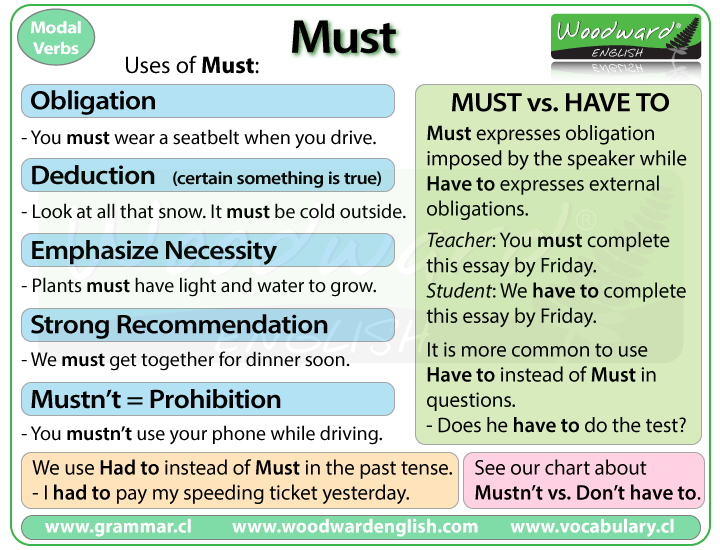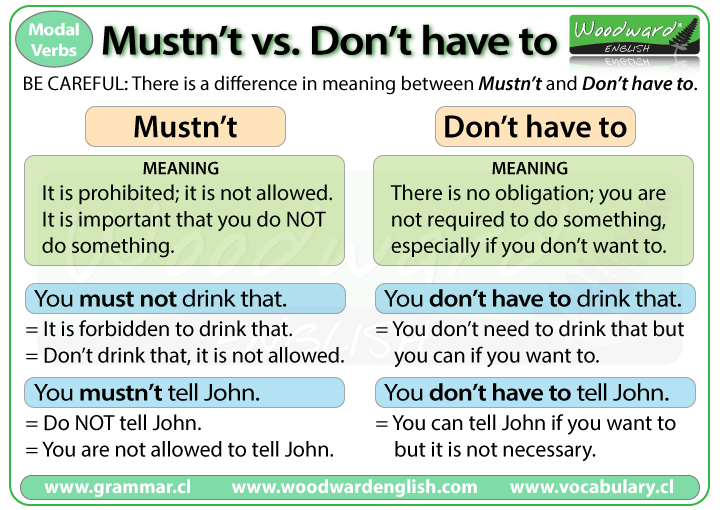Must
English Grammar - Modal Verbs
Must is a modal verb
Let's look at the different uses of MUST:
MUST
1. To express obligation or duty
This also refers to laws and regulations.
- I must memorize all of these rules about modal verbs.
- People must remain seated until the show is over.
- You must wear a seatbelt at all times.
2. To emphasize the necessity of something
- Humans must have drinking water at least every two days.
- You must give up smoking, it's bad for you.
- We must have a special permit to camp in the national park.
- You must study the last two chapters before the test.
- Plants must have light and water to grow.
- You must drive carefully.
3. Deduction - Sure that something is true (Certainty)
We use this when we don't know but we are certain that it is true (based on evidence).
- Look at all of that snow. It must be really cold outside.
- The ground was wet this morning. It must have rained last night.
- Dinosaurs were very big, they must have eaten a lot.
- It's five in the morning and you still haven't gone to bed? You must be tired!
- Jack must be home. I heard a noise coming from his room.
4. Expresses positive logical assumptions (Must + have + past participle)
- That must have been my mother calling me last night, nobody else has my number.
- He must have won the lottery with the new house and car he has just bought.
- She must have been at home - her car was there.
5. A strong recommendation
Something that is highly recommended (stronger than using should)
- We really must get together for dinner sometime.
- You must see the new Peter Jackson movie, it's fantastic.
- The ice cream here is delicious. You must try some.
Must Summary Chart

Mustn't
The negative is Mustn't which refers to prohibition (negative obligation)
Mustn't = Must not
- You mustn't use your smartphone while you are driving.
- You mustn't get on the subway if you haven't paid for the ride.
- You must not open the gift until it is your birthday.
- We must not tell anyone.
Must vs. Have to
Must can be replaced by Have to with little difference in meaning:
- You have to study. (= you must study)
- He has to finish the report by Friday. (= He must finish the report by Friday)
- They have to resit the test. (= They must resit the test)
Have to is a more informal while Must is mostly used in written orders or instructions.
Also, Must expresses obligation imposed by the speaker while Have to expresses external obligation.
- Teacher: You must complete this essay by Friday
- Student: We have to complete this essay by Friday.
When we are mentioning someone else's obligations, we use Have to.
- John has to quit smoking.
For questions it is more common to use Have to instead of Must (which sounds very formal):
- When do you have to finish the report?
- Does he have to take a blood test?
The past tense of Must is Had to:
- I had to pay my speeding ticket yesterday.
Mustn't vs. Don't have to
Be careful with the negative of Must and Have to where they DO have a different meaning. Mustn't is a negative obligation (= it is important that you do NOT do something) while Don't have to is an absence of obligation.
Mustn't = it is prohibited; it is not allowed
Don't have to = no obligation; you are not required to do something, especially if you don't want to.
- You must not drink that. (= it is forbidden to drink that; it is not allowed)
- You don't have to drink that. (= you don't need to drink that but you can if you want)
- You mustn't tell John (= Do not tell John)
- You don't have to tell John (= you can tell John if you want to but it is not necessary)

Next activity
See our notes about other Modal Verbs.
If you found these English Grammar Rules about MUST interesting or useful, let others know about it.
